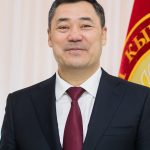Politics
Kyrgyzstan Politics
This page explores Kyrgyzstan’s political structure incorporating real-time RSS feed news and videos. By harnessing the power of RSS feeds, visitors can stay informed about the latest developments in Kyrgyzstan’s politics as they happen. The dynamic nature of these feeds ensures that users receive up-to-the-minute updates on political events, policy changes, and significant milestones, enabling them to stay abreast of the ever-evolving political scene.

6th President of Kyrgyzstan
Incumbent
Assumed office
28 January 2021
Image credit
Kyrgyzstan, a landlocked country in Central Asia, has experienced a tumultuous political landscape since gaining independence from the Soviet Union in 1991. The country’s politics have been characterized by frequent changes in leadership, political instability, and a struggle for democratic governance. One key feature of Kyrgyzstan’s political system is its semi-presidential form of government, where executive power is divided between the president and the prime minister. However, power struggles and conflicts between these positions have hindered effective governance and resulted in a series of political crises.
In recent years, Kyrgyzstan has witnessed several uprisings and revolutions, the most recent being the October 2020 protests. These mass demonstrations led to the resignation of President Sooronbay Jeenbekov and the appointment of Sadyr Japarov as the interim president. Japarov later won the presidential election in January 2021, consolidating his power.
The political landscape in Kyrgyzstan is also influenced by regional and ethnic dynamics. The country has a significant Uzbek minority, and tensions between the Kyrgyz majority and minority groups have occasionally erupted into violence. The government’s ability to address these ethnic divisions and ensure equitable representation remains a significant challenge. Furthermore, corruption and weak institutions have plagued Kyrgyzstan’s political system, impeding economic development and undermining public trust. The lack of transparency and accountability has hindered foreign investment and hindered progress towards a more prosperous and stable future. However, despite these challenges, Kyrgyzstan also demonstrates a vibrant civil society and an active political opposition. Non-governmental organizations and grassroots movements play a crucial role in advocating for democratic reforms, human rights, and social justice.
In conclusion, Kyrgyzstan’s politics have been marked by instability, power struggles, and ethnic tensions. The country faces ongoing challenges in establishing a strong and accountable government, combating corruption, and promoting inclusivity. However, the presence of an engaged civil society and a desire for democratic reforms offer hope for a more stable and prosperous future for Kyrgyzstan.
Unless other sources are listed, original content is provided by ChatGPT. ChatGPT may produce inaccurate information about people, places, or facts. #Kyrgyzstan #KyrgyzstanPolitics #KyrgyzstanNews #KyrgyzstanNewsToday #KyrgyzstanRSSFeed #BlahFace



